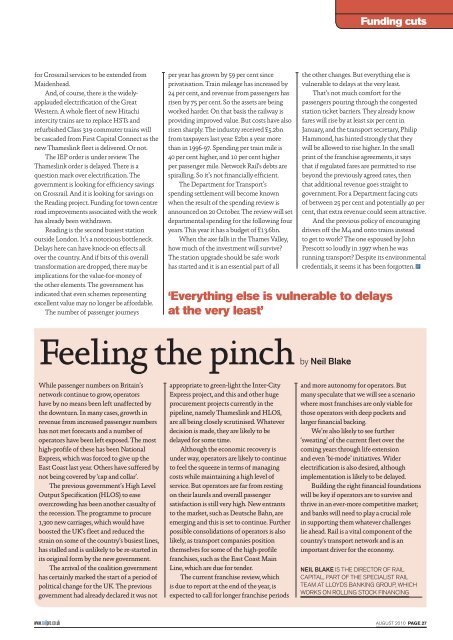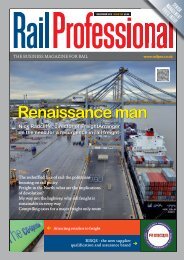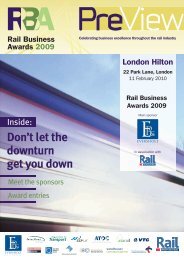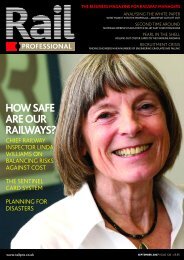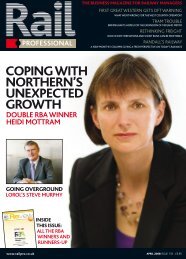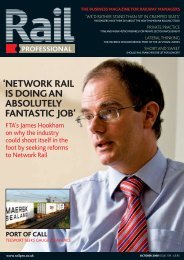View as PDF - Rail Professional
View as PDF - Rail Professional
View as PDF - Rail Professional
You also want an ePaper? Increase the reach of your titles
YUMPU automatically turns print PDFs into web optimized ePapers that Google loves.
Funding cuts<br />
for Crossrail services to be extended from<br />
Maidenhead.<br />
And, of course, there is the widelyapplauded<br />
electrification of the Great<br />
Western. A whole fleet of new Hitachi<br />
intercity trains are to replace HSTs and<br />
refurbished Cl<strong>as</strong>s 319 commuter trains will<br />
be c<strong>as</strong>caded from First Capital Connect <strong>as</strong> the<br />
new Thameslink fleet is delivered. Or not.<br />
The IEP order is under review. The<br />
Thameslink order is delayed. There is a<br />
question mark over electrification. The<br />
government is looking for efficiency savings<br />
on Crossrail. And it is looking for savings on<br />
the Reading project. Funding for town centre<br />
road improvements <strong>as</strong>sociated with the work<br />
h<strong>as</strong> already been withdrawn.<br />
Reading is the second busiest station<br />
outside London. It’s a notorious bottleneck.<br />
Delays here can have knock-on effects all<br />
over the country. And if bits of this overall<br />
transformation are dropped, there may be<br />
implications for the value-for-money of<br />
the other elements. The government h<strong>as</strong><br />
indicated that even schemes representing<br />
excellent value may no longer be affordable.<br />
The number of p<strong>as</strong>senger journeys<br />
per year h<strong>as</strong> grown by 59 per cent since<br />
privatisation. Train mileage h<strong>as</strong> incre<strong>as</strong>ed by<br />
24 per cent, and revenue from p<strong>as</strong>sengers h<strong>as</strong><br />
risen by 75 per cent. So the <strong>as</strong>sets are being<br />
worked harder. On that b<strong>as</strong>is the railway is<br />
providing improved value. But costs have also<br />
risen sharply. The industry received £5.2bn<br />
from taxpayers l<strong>as</strong>t year: £2bn a year more<br />
than in 1996-97. Spending per train mile is<br />
40 per cent higher, and 10 per cent higher<br />
per p<strong>as</strong>senger mile. Network <strong>Rail</strong>’s debts are<br />
spiralling. So it’s not financially efficient.<br />
The Department for Transport’s<br />
spending settlement will become known<br />
when the result of the spending review is<br />
announced on 20 October. The review will set<br />
departmental spending for the following four<br />
years. This year it h<strong>as</strong> a budget of £13.6bn.<br />
When the axe falls in the Thames Valley,<br />
how much of the investment will survive?<br />
The station upgrade should be safe: work<br />
h<strong>as</strong> started and it is an essential part of all<br />
the other changes. But everything else is<br />
vulnerable to delays at the very le<strong>as</strong>t.<br />
That’s not much comfort for the<br />
p<strong>as</strong>sengers pouring through the congested<br />
station ticket barriers. They already know<br />
fares will rise by at le<strong>as</strong>t six per cent in<br />
January, and the transport secretary, Philip<br />
Hammond, h<strong>as</strong> hinted strongly that they<br />
will be allowed to rise higher. In the small<br />
print of the franchise agreements, it says<br />
that if regulated fares are permitted to rise<br />
beyond the previously agreed rates, then<br />
that additional revenue goes straight to<br />
government. For a Department facing cuts<br />
of between 25 per cent and potentially 40 per<br />
cent, that extra revenue could seem attractive.<br />
And the previous policy of encouraging<br />
drivers off the M4 and onto trains instead<br />
to get to work? The one espoused by John<br />
Prescott so loudly in 1997 when he w<strong>as</strong><br />
running transport? Despite its environmental<br />
credentials, it seems it h<strong>as</strong> been forgotten.<br />
‘Everything else is vulnerable to delays<br />
at the very le<strong>as</strong>t’<br />
Feeling the pinch by<br />
Neil Blake<br />
While p<strong>as</strong>senger numbers on Britain’s<br />
network continue to grow, operators<br />
have by no means been left unaffected by<br />
the downturn. In many c<strong>as</strong>es, growth in<br />
revenue from incre<strong>as</strong>ed p<strong>as</strong>senger numbers<br />
h<strong>as</strong> not met forec<strong>as</strong>ts and a number of<br />
operators have been left exposed. The most<br />
high-profile of these h<strong>as</strong> been National<br />
Express, which w<strong>as</strong> forced to give up the<br />
E<strong>as</strong>t Co<strong>as</strong>t l<strong>as</strong>t year. Others have suffered by<br />
not being covered by ‘cap and collar’.<br />
The previous government’s High Level<br />
Output Specification (HLOS) to e<strong>as</strong>e<br />
overcrowding h<strong>as</strong> been another c<strong>as</strong>ualty of<br />
the recession. The programme to procure<br />
1,300 new carriages, which would have<br />
boosted the UK’s fleet and reduced the<br />
strain on some of the country’s busiest lines,<br />
h<strong>as</strong> stalled and is unlikely to be re-started in<br />
its original form by the new government.<br />
The arrival of the coalition government<br />
h<strong>as</strong> certainly marked the start of a period of<br />
political change for the UK. The previous<br />
government had already declared it w<strong>as</strong> not<br />
appropriate to green-light the Inter-City<br />
Express project, and this and other huge<br />
procurement projects currently in the<br />
pipeline, namely Thameslink and HLOS,<br />
are all being closely scrutinised. Whatever<br />
decision is made, they are likely to be<br />
delayed for some time.<br />
Although the economic recovery is<br />
under way, operators are likely to continue<br />
to feel the squeeze in terms of managing<br />
costs while maintaining a high level of<br />
service. But operators are far from resting<br />
on their laurels and overall p<strong>as</strong>senger<br />
satisfaction is still very high. New entrants<br />
to the market, such <strong>as</strong> Deutsche Bahn, are<br />
emerging and this is set to continue. Further<br />
possible consolidations of operators is also<br />
likely, <strong>as</strong> transport companies position<br />
themselves for some of the high-profile<br />
franchises, such <strong>as</strong> the E<strong>as</strong>t Co<strong>as</strong>t Main<br />
Line, which are due for tender.<br />
The current franchise review, which<br />
is due to report at the end of the year, is<br />
expected to call for longer franchise periods<br />
and more autonomy for operators. But<br />
many speculate that we will see a scenario<br />
where most franchises are only viable for<br />
those operators with deep pockets and<br />
larger financial backing.<br />
We’re also likely to see further<br />
‘sweating’ of the current fleet over the<br />
coming years through life extension<br />
and even ‘bi-mode’ initiatives. Wider<br />
electrification is also desired, although<br />
implementation is likely to be delayed.<br />
Building the right financial foundations<br />
will be key if operators are to survive and<br />
thrive in an ever-more competitive market;<br />
and banks will need to play a crucial role<br />
in supporting them whatever challenges<br />
lie ahead. <strong>Rail</strong> is a vital component of the<br />
country’s transport network and is an<br />
important driver for the economy.<br />
NEIL BLAKE IS THE DIRECTOR OF RAIL<br />
CAPITAL, PART OF THE SPECIALIST RAIL<br />
TEAM AT LLOYDS BANKING GROUP, WHICH<br />
WORKS ON ROLLING STOCK FINANCING<br />
AUGUST 2010 PAGE 27


